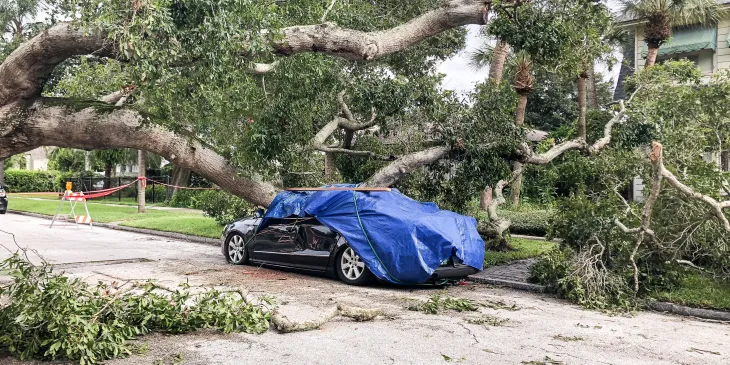Flash Floods: Tips for Avoiding the Hidden and Costly Dangers

The August flash floods that hit Dallas caused six billion dollars in damage. Each year, flash floods damage property and landscapes, but they also lead to a loss of life for some. Fast-moving waters sweep away anything in their path: cars, structures, and more.
If you live in an area prone to flash flooding, you must protect yourself and your family. We've researched the best tips to avoid the hidden dangers and costs of flash floods and a few tips on what to do if caught in a hazardous situation.
Among all 50 states, the National Weather Service identifies Texas as the most flash-flood-prone area in the U.S., costing lives and damaging property yearly. While this news might seem grim, there are several things you can do to protect yourself, your loved ones, and your property against flood damage.
Flash Floods: Curiosities and Causes
Many conditions can cause floods, including heavy rains, tsunamis, river and coastal flooding, and hurricanes. However, unlike regular flooding, which occurs slowly, flash floods happen quickly and often with fast-moving waters and dangerous currents.
While flash floods can happen when conditions are right for them, they often occur from April through September, when thunderstorms and heavy rainfall are more common.
The danger behind flash floods is that they can strike with little to no warning. Follow weather updates when your area is at risk of floods, heavy rain, or storms.
Preparing for Flash Floods
Preparation is the key to surviving a flood and limiting the damage to your property when the water rises. Have an emergency kit on hand if you're affected by a flood and need to escape quickly. An emergency kit should contain the essentials to get you and your family through three or four days and include water, food, flashlights, and batteries, among other survival items. In addition, having enough gas to evacuate during an emergency is essential and may save your life; plan to keep at least half a tank of gas in your vehicle at all times.
It would help if you also prepared your home for flooding. However, sometimes this isn't always possible.
Have a Plan and Follow It
Having a plan for emergencies is essential. Start by checking with your local officials about emergency evacuation procedures. Then, create a plan with your family on where to meet should you become separated.
Avoid Hazards
Many hazards come with flash floods; knowing how to avoid them could save your life. Be aware of your surroundings and know what to do when a flash flood warning is issued.
If caught in a flash flood, the National Weather Service recommends avoiding low-lying areas subject to flash flooding, including canyons, valleys, and riverbeds or other bodies of water. Stay away from flooded areas and wait for the waters to recede before crossing a river or stream. Also, don't drive through fast-moving water; even if the water looks shallow, it can be deceptively deep.
Floodwater also might be contaminated with chemicals or hidden objects that could cause injury. If you must walk through floodwaters, use a stick to feel for obstacles in your path and to test water depth before each step forward. Be especially careful when crossing bridges, as flash floods can damage them.
What to Do If Your Home Is Flooded
If your home floods, turn off the water and electricity to avoid fires and other problems, but only if you can do this without stepping into the water. Don't enter a flooded building until you've confirmed it's safe. Then, call your insurance company to start the claims process.
Cleaning up after a flood is a tremendous job. You'll likely need to hire a professional restoration company to help you repair and restore your home and belongings. These companies have the experience, equipment, and resources necessary to complete the job quickly and correctly.
How to Cover Flood Damage Costs
Most homeowners insurance policies don't cover flood damage, so you'll need to purchase a separate flood insurance policy to protect your home and property against losses. However, buying flood insurance is still a good idea even if you don't live in a high-risk area because flash floods can happen anywhere.
Flood insurance doesn't cover everything; for example, it won't help you rebuild your home if destroyed. Instead, flood insurance covers a portion of the damages to your home and property. In addition, there are other ways to cover gaps left by flood insurance, such as a disaster relief loan from the Small Business Administration or a personal loan from your bank.
The Final Word
No one is immune to flash floods, but you can take steps to protect your home and property against the dangers they pose. By being prepared and knowing what to do in case of a flood, you can help minimize the damages caused by these natural disasters and keep yourself and your family safe.
Sources
- https://www.dallasnews.com/news/weather/2022/08/25/dallas-fort-worth-flood-caused-as-much-as-6-billion-in-damages/
- http://texasfloodfacts.com/
- https://www.army.mil/article/244638/flash_flood_season_an_annual_issue_in_central_texas#:~:text=FORT%20HOOD%2C%20Texas%20%2D%20While%20many,June%2C%20and%20August%20to%20September.
- https://www.fema.gov/press-release/20210318/how-build-kit-emergencies
- https://recovery.texas.gov/documents/disaster-preparedness/disaster-evacuation-checklist.pdf
- https://www.census.gov/topics/preparedness/events/floods/2022-dallas-flood.html
- https://www.census.gov/quickfacts/fact/table/US/PST045221
- https://www.fema.gov/about/organization/region-6/available-flood-hazard-data-tables-texas
- https://www.texastribune.org/2022/08/22/dallas-flooding-fort-worth/
- https://floodlist.com/america/usa
- https://www.dallasnews.com/news/weather/2022/08/25/dallas-fort-worth-flood-caused-as-much-as-6-billion-in-damages/
- https://www.houselogic.com/finances-taxes/home-insurance/what-does-flood-insurance-cover/#:~:text=Flood%20insurance%20is%20mostly%20purchased,personal%20property%20up%20to%20%24100%2C000
- https://www.weather.gov/safety/flood-during
- https://www.safewise.com/home-security-faq/house-flood/
- https://www.sba.gov/funding-programs/disaster-assistance




